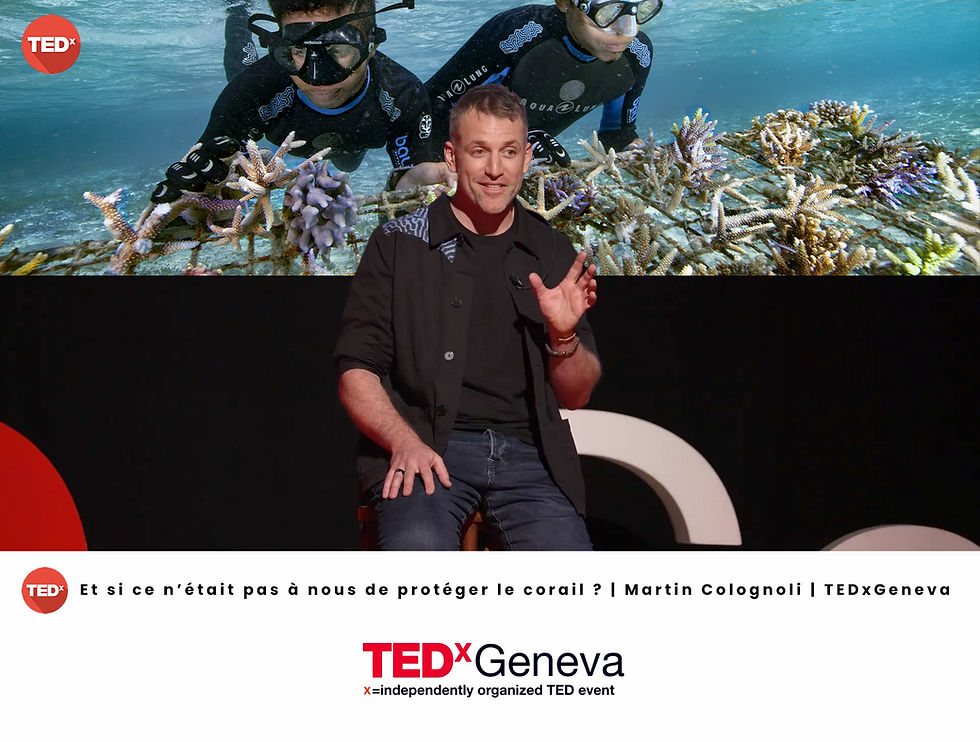Canon commits to coral reefs: an innovative partnership for the regeneration of life.
- Martin Colognoli

- Sep 9, 2025
- 4 min read

Introduction
Coral reefs are in danger. Faced with accelerating climate change, pollution, and human pressures, these essential ecosystems are disappearing at an alarming rate. Yet they are home to more than 25% of marine biodiversity and protect the coastlines of millions of people around the world.
In this context, Canon, Nature Seychelles, and Coral Spawning International (CSI) are joining forces in a groundbreaking partnership to restore coral reefs using cutting-edge science and imaging. This pilot project, based in the Seychelles, marks a decisive step towards more sustainable, efficient, and collaborative regeneration.
Why Coral Reefs Are Essential to Our Future
What reefs bring us
Coral reefs are true pillars of marine balance:
They are home to thousands of species : fish, crustaceans, mollusks, algae, building corals, etc.
They ensure food security for millions of people in coastal areas.
They protect coasts against erosion and storms.
They represent a major economic issue : fishing, tourism, medicine.
But their fragility is extreme. In the Seychelles, more than 90% of the reefs bleached during the 1998 El Niño event. Another massive bleaching event occurred in 2016. Since then, the race against time has been on.
An unprecedented partnership to regenerate coral reefs
This project brings together three complementary actors:
Canon , the world leader in imaging, puts its technology at the service of living things.
Coral Spawning Lab , founded by biologists Jamie Craggs and Margaret Miller, pioneers of sexual reproduction in corals.
Nature Seychelles , a local NGO engaged in ecological restoration for over 20 years.
The goal: to use science, technology and local cooperation to regenerate a healthy, functioning and resilient coral reef .
This partnership is taking shape at the ARC (Aquaculture and Reef Conservation) laboratory on Praslin Island. It is here that researchers mimic lunar cycles to trigger coral spawning, collect gametes, and fertilize new colonies in the laboratory.

Imaging technology for marine life
Canon provides the essential optical tools for this scientific adventure. The team uses in particular:
Canon EOS R5 cameras,
macro lenses to capture details of fertilization,
photomicrography and photogrammetry solutions,
video equipment to document every step.
These images are not only aesthetic: they are used for research, training, communication and raising awareness among the general public .
Canon thus transforms imaging into a regeneration tool , putting precision at the service of living things.
Coral Spawning Lab: Pioneers of Coral Reproduction
The method used is called coral matchmaking . It relies on the controlled sexual reproduction of corals, unlike clonal approaches. This allows:
promote greater genetic diversity ,
increase resilience to environmental changes,
develop colonies capable of adapting to the future climate.
The protocols developed by CSI are open, documented and reproducible . They can be shared with other laboratories, NGOs or conservation projects around the world.
This transfer of knowledge is at the heart of the partnership.

Nature Seychelles: Anchoring regeneration in the community
The NGO Nature Seychelles plays a key role in implementing the project. Through its local network, it enables:
the training of young Seychellois ,
the involvement of local communities in conservation,
the integration of the project within the LEAP (Locally Empowered Area Protection) program.
This shared governance model ensures that restoration is locally anchored , and that it benefits both ecosystems and humans.
Canon and biodiversity: a global strategy
Canon is not just providing equipment. This partnership is part of a broader strategy driven by the Kyosei philosophy, which means "living and working together for the common good."
For several years, Canon has been working for biodiversity through:
forest restoration ,
the preservation of wetlands ,
the creation of ecological corridors ,
partnerships with NGOs and scientists around the world.
This project in the Seychelles embodies a vision: that of a technology allied with the living, and not destructive.
What this project really changes
This approach marks a turning point in reef restoration:
It abandons cloning , which is often used but genetically limited.
It favors natural, resilient, genetically diverse reconstruction .
It produces a strong local impact , with shared skills.
And above all, it reveals the invisible: what happens at the cellular level, what is reborn in warm waters, what technology can make visible and accessible.
Conclusion
Coral reefs are symbols of beauty, complexity, and fragility. Canon, in partnership with the Coral Spawning Lab and Nature Seychelles, demonstrates how technological innovation can contribute to their regeneration.
Thanks to a collaboration between science, image and field, this project embodies a hope: that of reconciling progress and protection of living things .
References
Craggs, J., Guest, J.R., Davis, M., Sweet, M., & Hagedorn, M. (2019). Coral sexual reproduction in ex situ aquaria: A tool for reef restoration. Frontiers in Marine Science.
Donner, SD, Skirving, WJ, Little, C.M., Oppenheimer, M., & Hoegh-Guldberg, O. (2005). Global assessment of coral bleaching and required rates of adaptation under climate change. Global Change Biology.
Nature Seychelles (2024). Reef Rescuers Project – Monitoring Report. www.natureseychelles.org
Canon Sustainability Report 2025. www.canon.fr
Coral Spawning Lab – Project Methods Overview. www.coralspawninglab.org
IPBES (2022). Summary for policymakers of the assessment report on biodiversity and ecosystem services. www.ipbes.net




